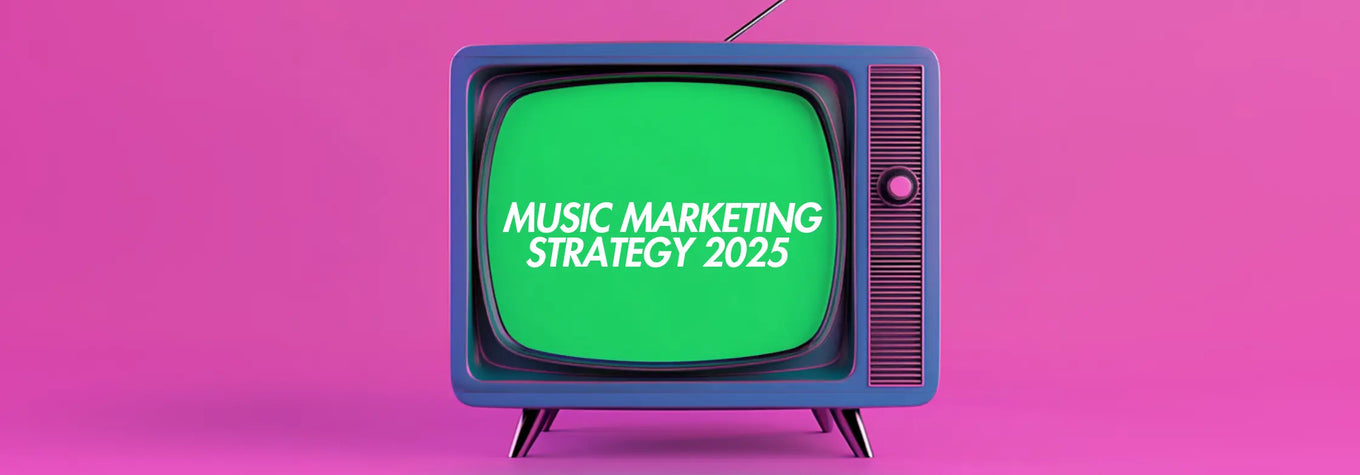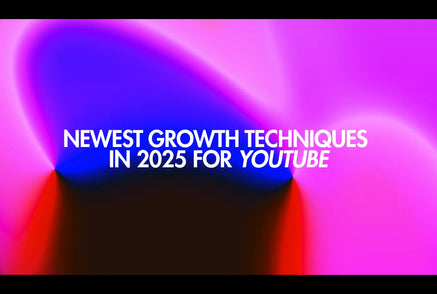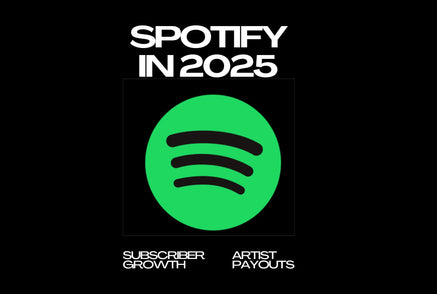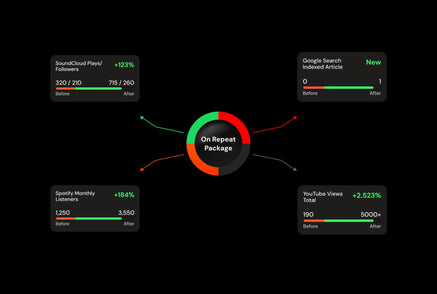How Marketing Strategies for Musicians in 2025 Are Made?
The competitiveness of the music streaming platforms is rising like never before. Musicians are seeking to use every opportunity to push their tracks and get on top. The quicker you start getting streams after the release, the better it will be for your overall engagement. genre-related playlists due to high engagement.
On Spotify, mixes like Discover Weekly are generated for each user due to their preferences. If your music gets attention and engagement, it may be put into somebody's personalized playlist. A playlist appearance is a great way to boost your music and establish your presence on the platform, especially if you expect your new music to be on top.
To achieve such a breakthrough, it’s necessary to have a thoughtful strategy that empowers your music efforts and helps you get into the spotlight. In this article, we will show you how to create an effective marketing strategy in 2025 and make your music louder and appear on multiple platforms. You'll find out:
-
What are the most important components of the music marketing strategy?
-
What tools and platforms should be used for music marketing?
-
How to establish a connection with your audience?
The music business is tough only if you don't know what to do. We give you a roadmap and explain how to get your music heard by presenting key takeaways from marketing strategies for musicians.
Why Is Music Marketing Strategy Significant for Your Success?
One of the biggest misconceptions is that marketing strategies are made only to get streams on the platform you are originally based on. Once you effectively market your music, you open yourself multiple channels for revenue, getting in touch with promoters, distributors, and other major players in the industry. With an effective approach to digital marketing, you increase your value as a musician. Moreover, you open yourself to more perspectives for career development.
There are 4 key P`s of a successful marketing strategy:
-
Promotion (how you share your content)
-
Price (how much do you get for your music)
-
Place (where do you distribute your music)
-
Product (the songs you publish and promote)
To ensure your strategy works well, you have to follow essential steps. In the end, all pieces of the puzzle will be brought together, and you will see the growth.
What Makes a Successful Music Marketing Strategy in 2025?
Music marketing consists of several major elements that make up a complete strategy. You invest in promotion, social presence, make great music, and remain active, it won't take long to reach new audiences and see your music in the top spots of various charts. Let's break down each part and reveal the essentials that make a successful music marketing strategy in 2025.
Personal Brand Comes First
First and foremost, you have to develop your brand. Not just a profile name, but a trademark that will stand out, as it's what you push during your music career. You develop a clear identity like Kendrick Lamar or Eminem, or you become a mysterious personality like Marshmello, when your tracks speak for you.
Marshmello may look strange due to his strange hat and suit. However, when he headlines top events like the UEFA Champions League Final 2021, you understand how powerful this personal brand is in the music industry.
When you promote your music through social media platforms, the first thing that matters is your presentation. You create a strong first impression where the high-quality music meets a recognizable profile. Whether you go with TikTok or Instagram, you have to develop a solid social media presence and influence. You're not just a random person offering others to listen to your music—you are the one who makes the difference. If you're looking for relevant tips on developing a personal brand, check our article.
Social media are essential for establishing your brand and effectively promoting your songs. Every time you release a track or an album, you have to make sure it's visible to a bigger part of your audience. Utilize available methods of content posting to present your songs. Since you may have different types of audiences on these platforms, you should not limit yourself to using a single platform. Establish your presence on TikTok, Instagram, Twitter, and Facebook (optional) to make more users recognize you. Moreover, each platform represents its unique audience, so you have to be creative and create various content to impress them.
Decide What Product You Deliver
One of the key components of any marketing strategy is a product. You have to understand what product you deliver. Once you identify yourself as a songwriter/musician, your final product will be a released song or an album. If you identify yourself as a DJ, your product will be a gig or a concert, which later turns into a concert tour, giving you pace for multiple tours.
Obtain a License
Most creators forget about this point, but getting a license for your product is one of the most crucial parts for musicians. Moreover, a license on the product will significantly increase your income. For example, Eminem's song Venom became commercially successful, reaching the top 10 ranks in the Czech Republic, Slovakia, and Greece. The license allows others to use your music in games, TV promos, commercials, movies, etc., and you will get paid for each usage. With that, Travis Scott and The Weeknd became the headliners of WrestleMania 41.
Set Clear Goals
A marketing plan should always include goals. Once you decide to develop your brand without a clear purpose, your methods may not be as successful as you expect. However, when you understand why you are pushing your music using social media and developing a personal brand, the process becomes clear and enjoyable. For example, if you're primary goal is to achieve 1 million listens on Spotify, you can identify steps needed to achieve this goal (increase your audience, share songs on music-related forums, increase social media activity, etc.).
You're not only a musician, but a complete influencer, consider achieving consistant growth on all platforms. Whether it's a single music release, an album drop, or an event announcement, synchronize it with your strategy and make sure it's pushed through your social channels.
Once the goal of your music promotion strategy is to increase the number of listeners, you should intensify social media promotion by increasing the number of posts and using all the available formats. Moreover, simply showcasing your songs is not enough. You have to encourage users to follow your profile on the music platform. You must sell your music to your audience on social media as well as present it to the music lovers who don't follow you. It's not just music share. It's an influencer marketing.
Build Connections with Your Audience
You won't succeed unless you understand what your audience wants from you. Once you are a beginner and you want to keep advancing in this industry, it's essential to stay in touch with your listeners and consider their needs. How to do that? Depending on your approach and the type of product you generate, a connection with the audience can be established in numerous ways. We represented them in the table below.
|
Part of the Strategy |
Short Description |
Best Practices / Recommendations |
|
Embrace AI-Driven Insights |
Use AI tools to analyze trends, predict fan behavior, and personalize outreach. |
Leverage platforms for AI music promotion and creation. Use tools like Chartmetric or Soundcharts for strategy. |
|
Prioritize Short-Form Video |
Create captivating TikToks, Instagram Reels, and YouTube Shorts to drive discovery and fan engagement. |
Post behind-the-scenes content, song teasers, and live performance clips to maintain visibility and virality. |
|
Collaboration and Networking |
Partner with musicians, influencers, and industry pros to reach new and diverse audiences. |
Try international or genre-blending collabs. Cross-promote releases through shared social media pushes. |
|
Optimize Streaming Strategies |
Ensure availability on all streaming services and focus on playlist inclusion. |
Analyze streaming data to improve track performance. Pitch to curators and encourage fan saves and shares. |
|
Build a Strong Online Presence |
Maintain a cohesive digital brand across all platforms. |
Create a professional website, use consistent visuals, and interact authentically with fans on social media. |
|
Focus on Community Building |
Cultivate a dedicated fanbase through personal interaction and exclusive content. |
Host live sessions, reply to comments, and reward loyal fans via subscriptions, Discord groups, or private streams. |
|
Invest in High-Quality Visuals |
Produce visually striking content that reflects your brand identity and engages viewers. |
Align videos, covers, and promotional graphics with your artistic tone and storytelling. |
|
Utilize Music Marketing Tools |
Use scheduling, analytics, and promo platforms to streamline your workflow. |
Platforms like Social Champ (social media) and Music Worx for campaign management help optimize marketing efforts. |
|
Stay Adaptable and Innovative |
Keep pace with evolving trends and technologies in music marketing. |
Monitor emerging platforms, experiment with new formats, and remain agile in changing industry landscapes. |
Understand What Your Audience Likes the Most
Your marketing efforts won't bring the desired effect if you don't know your audience well. The best music marketing strategy is the one adapted to the preferences of the listeners. People may want to hear your music, but it won't happen until you find the right approach to get to them. Every independent artist and every band has an individual approach, using unique promotion techniques. Still, they are all based on key data about the audience. How to get the most important information about the audience?
-
Use built-in tools in social media and music platforms. For example, Spotify for Artists and SoundCloud Next Pro brings access to advanced analytics. Platforms like TikTok and Instagram also provide access to key data about your followers, their activity, age gaps, etc.
-
Launch polls asking users to answer a few questions. With it, you'll be able to know who follows you, what are their average activity time, etc. Based on this information, you can create a more effective marketing strategy and build community around your music.
Receiving information about your followers helps you correct the plan of using marketing channels and make it more advantageous. Music industry professionals had long paths to success analyzing their mistakes, changing approaches, and increasing the number of users who see their content.
Later, when you get the first followers and reach the first milestones in music streaming, you may think about investing in paid promotion. Some artists consider this ineffective due to multiple reasons, mainly because they don't trust services that offer such options.
Major stars like Drake or 50 Cent don't need paid promotion because their visibility works for them. Still, till you are not on their level, focus on delivering high-quality content and gathering new fans around you.
Don't hesitate to invest in paid promotion regardless of what streaming platforms you use. On Artist Push, you can effectively promote your music and get organic engagement, so your content will be shown to music fans who enjoy the same genre or search for music similar to yours. Depending on the size of your audience and your final goals, you can pick a needed promotion package and expect significant engagement growth shortly.
Decide Whether You Want to Sell Merchandise or Not
Merchandise releases also become a part of many marketing strategies for independent artists. You can share T-shirts, hats, jerseys, and accessories representing your unique design. Understand that selling merchandise is not what should be done immediately after launching your marketing strategy.
Picking the right platform for merchandise release is also important. In this video, the author tells about top platforms to promote your goods and make a lot of money from this initiative. Most effective marketing campaigns are based on merch, and you can do so.
You can do it later after achieving significant success and establishing a presence at least on the local music scene. If the number of people interested in your music is low, there's no sense in such investment. It can be unprofitable, slowing down your progress and making a negative impact on your marketing budget.
The latest collaboration between FC Barcelona and Travis Scott shows how effective big brand collaborations could be. Moreover, it’s a part of a long-term strategy, since the Spanish club already collaborated with Cold Play, Rosalia, Drake, and others.
Set Timelines for Your Marketing Strategy
Music marketing plans must have clear time frames. Identifying the starting and the ending date of music promotion allows you to:
-
Set clear goals.
-
Measure your success.
-
Precisely analyze your activity and identify gaps.
The optimal length of the marketing strategy is up to 3 months. During this time, you can announce, release, and push several songs to achieve the desired level of activity. If you decide to go further and extend your strategy up to 6-12 months, expect more valuable results. When you complete all parts of the plan, you don't need to lower your activity. Take time to analyze your approach and implement changes. A music marketing degree is not necessary as you can build a personalized approach from scratch and develop it all the time. Global trends always change, and you have to consider that to effectively distribute your music among potential listeners.
Why marketing is so important for musicians?
How to do be effective in music marketing?
How often to post on TikTok for follower growth?
When it's too old to start a music career?
Is AI important for music marketing in 2025?























